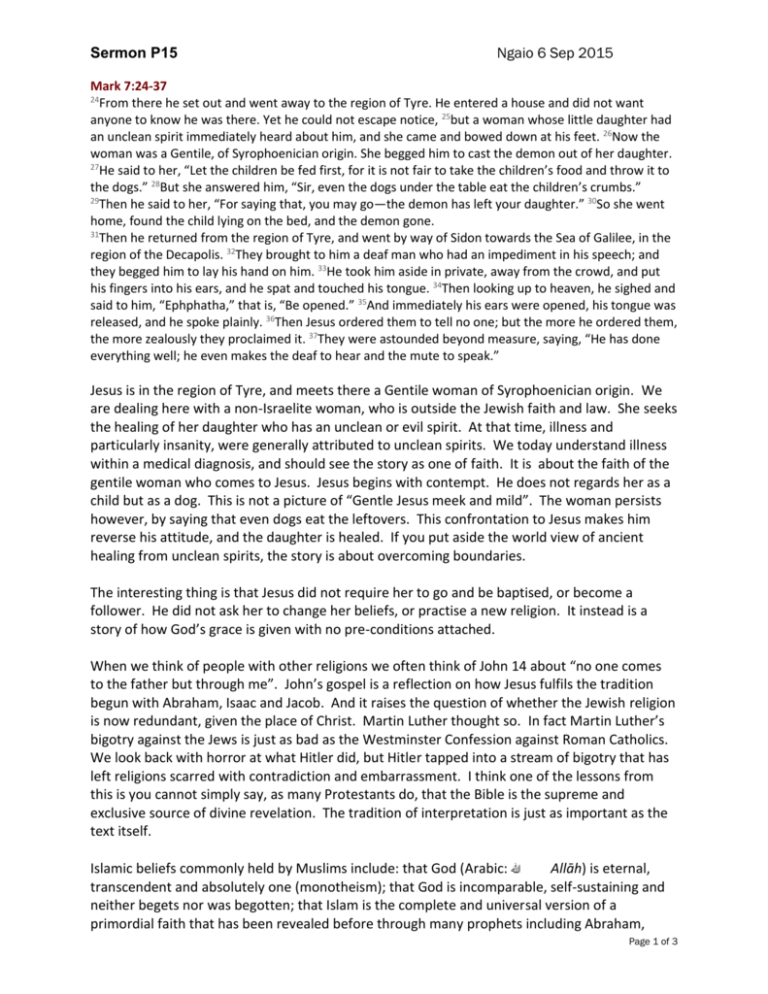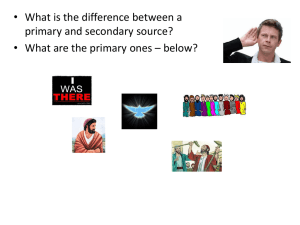THE ONLY GRACE you can have is the grace you can imagine
advertisement

Sermon P15 Ngaio 6 Sep 2015 Mark 7:24-37 24 From there he set out and went away to the region of Tyre. He entered a house and did not want anyone to know he was there. Yet he could not escape notice, 25but a woman whose little daughter had an unclean spirit immediately heard about him, and she came and bowed down at his feet. 26Now the woman was a Gentile, of Syrophoenician origin. She begged him to cast the demon out of her daughter. 27 He said to her, “Let the children be fed first, for it is not fair to take the children’s food and throw it to the dogs.” 28But she answered him, “Sir, even the dogs under the table eat the children’s crumbs.” 29 Then he said to her, “For saying that, you may go—the demon has left your daughter.” 30So she went home, found the child lying on the bed, and the demon gone. 31 Then he returned from the region of Tyre, and went by way of Sidon towards the Sea of Galilee, in the region of the Decapolis. 32They brought to him a deaf man who had an impediment in his speech; and they begged him to lay his hand on him. 33He took him aside in private, away from the crowd, and put his fingers into his ears, and he spat and touched his tongue. 34Then looking up to heaven, he sighed and said to him, “Ephphatha,” that is, “Be opened.” 35And immediately his ears were opened, his tongue was released, and he spoke plainly. 36Then Jesus ordered them to tell no one; but the more he ordered them, the more zealously they proclaimed it. 37They were astounded beyond measure, saying, “He has done everything well; he even makes the deaf to hear and the mute to speak.” Jesus is in the region of Tyre, and meets there a Gentile woman of Syrophoenician origin. We are dealing here with a non-Israelite woman, who is outside the Jewish faith and law. She seeks the healing of her daughter who has an unclean or evil spirit. At that time, illness and particularly insanity, were generally attributed to unclean spirits. We today understand illness within a medical diagnosis, and should see the story as one of faith. It is about the faith of the gentile woman who comes to Jesus. Jesus begins with contempt. He does not regards her as a child but as a dog. This is not a picture of “Gentle Jesus meek and mild”. The woman persists however, by saying that even dogs eat the leftovers. This confrontation to Jesus makes him reverse his attitude, and the daughter is healed. If you put aside the world view of ancient healing from unclean spirits, the story is about overcoming boundaries. The interesting thing is that Jesus did not require her to go and be baptised, or become a follower. He did not ask her to change her beliefs, or practise a new religion. It instead is a story of how God’s grace is given with no pre-conditions attached. When we think of people with other religions we often think of John 14 about “no one comes to the father but through me”. John’s gospel is a reflection on how Jesus fulfils the tradition begun with Abraham, Isaac and Jacob. And it raises the question of whether the Jewish religion is now redundant, given the place of Christ. Martin Luther thought so. In fact Martin Luther’s bigotry against the Jews is just as bad as the Westminster Confession against Roman Catholics. We look back with horror at what Hitler did, but Hitler tapped into a stream of bigotry that has left religions scarred with contradiction and embarrassment. I think one of the lessons from this is you cannot simply say, as many Protestants do, that the Bible is the supreme and exclusive source of divine revelation. The tradition of interpretation is just as important as the text itself. Islamic beliefs commonly held by Muslims include: that God (Arabic: هللا Allāh) is eternal, transcendent and absolutely one (monotheism); that God is incomparable, self-sustaining and neither begets nor was begotten; that Islam is the complete and universal version of a primordial faith that has been revealed before through many prophets including Abraham, Page 1 of 3 Moses, Ishmael and Jesus; that these previous messages and revelations have been partially changed or corrupted over time and that the Qur'an is the final unaltered revelation from God. https://en.wikipedia.org/wiki/Muslim Muhammad was born approximately in 570 CE in the Arabian city of Mecca. So when John’s gospel – written about the end of the first century, - says “no-one comes to the father but by me” he cannot have had Islam in mind. Neither can we say that John’s gospel was talking about the great Eastern religions of Buddhism or Hinduism. No, John’s gospel is a reflection taking place in the Mediterranean, and we should not take it out of that context. One of the insights of the reformation was that instead of looking at christianity from the delta where it hits the sea, to go upstream and look at Christianity before it gets polluted. The Protestant view was that the upstream source is found in the Bible, not tradition, and certainly not in the practices of Rome. Now whatever the merits of such a view, it becomes apparent fairly quickly that you cannot discuss the Bible without listening to it from within a tradition. But secondly, and more importantly, our Christian life and practice stands within a tradition. And much of the ethical dilemmas of our age – such as nuclear war, over population, the ecological destruction of the climate, the ethics of the distribution and pricing of medical drugs, birth control and so on – all these are ethical matters that are not addressed as such in the biblical text. What happens as we think about these issues, we draw on some basic insights, such as the command to love, and then draw out those basic commands into a more detailed discussion that we might apply to and think about as we search for ethical practices. Can I say from a personal point of view, I find the Methodist perspective on this more helpful thatn the Presbyterian. The Methodist stance openly acknowledges the place of my own Christian experience, the use of my mind, and the use of tradition. This leads me to thinking about the relationship between the Christian religion and other religions. For example, there is a movement called “the common word”. A Common Word between Us and You is an open letter, dated 13 October 2007, from leaders of the Islamic religion to leaders of the Christian religion. It calls for peace between Muslims and Christians and tries to work for common ground and understanding between both religions, in line with the commandment to “Say people of the scripture! Come to a common word between us and you: That we worship none but God” and the Biblical commandment to love God and one’s neighbor. In the time since its release, "A Common Word" opened an interfaith dialogue between Christians and Muslims. What we can find, if we read carefully, is that the religions of the world do have some common words. Their rituals and creeds may be different. Their founding figures are born in different places and times. Yet there will be common words. That does not mean I need to weaken or lesson my allegiance to Christ. What is does mean that the religions of the world need to stand together in our witness against the forces of evil and destruction. We need to avoid being used in a photoshot by political leaders, or being made subservient to the State. We need to stand against the use of religion for war or vandalism, or self serving national interests. Our history is full of cases like the thirty years war in Central Europe in the 15th century, or religious wars of the crusades. We have plenty of guilt to manipulate. However one the great things of the Christian faith is we can confess and seek forgiveness. If we do it opens up new life and new directions. Page 2 of 3 The syrophenoecian woman who was a Gentile asked for and received from Jesus the healing for her daughter. She was not a Jew nor a follower of Jesus. But the grace of God was given to her. It is a story which allows us to be open to others, and accept them for who they are. Page 3 of 3









